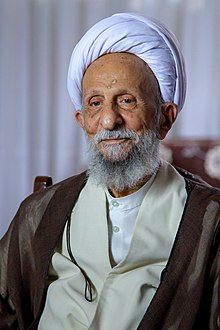Our website is made possible by displaying online advertisements to our visitors.
Please consider supporting us by disabling your ad blocker.
Taqi Yazdi
Taqi Yazdi | |
|---|---|
| تقی یزدی | |
 Yazdi in 2020 | |
| Member of the Assembly of Experts | |
| In office 23 February 1999 – 23 May 2016 | |
| Constituency | Tehran Province |
| In office 21 February 1991 – 22 February 1999 | |
| Constituency | Khuzestan Province |
| Personal details | |
| Born | Taqi Givechi[1] 31 January 1935 Yazd, Imperial State of Persia |
| Died | 1 January 2021 (aged 85) Tehran, Iran |
| Resting place | Fatima Masumeh Shrine |
| Political party | Front of Islamic Revolution Stability (spiritual leader)[2] |
| Other political affiliations | Society of Seminary Teachers of Qom[3] |
| Children | 2 sons and 1 daughter[1] |
| Relatives | Hossein Noori Hamedani (affinal)[1] |
| Occupation | Political activist |
| Years active | 1963–1964[1] 1989–2021[1] |
| Membership | Supreme Council of the Cultural Revolution Ahl Al-Bayt World Assembly |
| Signature |  |
| Website | Official website |
| Theological work | |
| Religion | Islam |
| Denomination | Jaʿfari Twelver Shīʿā |
| Era | Contemporary Islamic philosophy |
| Main interests | Guardianship of the Islamic Jurist, Jihad[4] |
| Notable ideas | Incompatibility of Islam and democracy[5] |
| Years active | 1947–1960 (study)[6] 1966–2021 (teaching)[6] |
| Alma mater | Qom Seminary Hindi School, Najaf (1950) Shāfīʿiya School, Yazd (1940s) Khān School, Yazd (1940s) |
| Taught at | Qom Seminary Haghani Seminary Feyziyeh Seminary |
| Institution | Imam Khomeini Educational Research Institute (1991–2021) In the Path of God Institute (1976–2021)[6] |
Muhammad Taqi Misbah Yazdi Giwachi (Persian: محمدتقی مصباح یزدی گیوهچی, romanized: Muḥammad Taqī Miṣbāḥ Yazdī Gīwachī; 31 January 1935 – 1 January 2021) was an Iranian Shia scholar, political theorist and philosopher who served as the spiritual leader of the Front of Islamic Revolution Stability.
He was a member of the Assembly of Experts,[7][8] the body responsible for choosing the Supreme Leader, where he headed a minority faction.[9] He had been called 'the most conservative' and the most 'powerful' clerical oligarch in Iran's leading center of religious learning, the city of Qom.[10] Many of his students have gone on to "occupy sensitive administrative and security posts" in the Islamic Republic, serving as "guardians" of (his version of) Islamic government.[10]
From 1952 to 1960, in the holy city of Qom, he participated in the courses taught by Ruhollah Khomeini and Muhammad Husayn Tabataba'i; and, for approximately fifteen years, he was a student of Mohammad-Taqi Bahjat Foumani.[11]
Mesbah Yazdi advocated Islamic philosophy and in particular Mulla Sadra's transcendent school of philosophy (Hikmat-e Muta`aliya). He believed that Iranians were moving away from religion and the values of Islamic revolution; and opposed western-style freedom and democratic governance,[12] promoted by the Iranian reform movement.[13][14]
- ^ a b c d e Nikpour, Abbas (March 2002) [Esfand 1380–Farvardin 1381], "Ayatollah Mesbah, From Margins to the Middle of the Text", Gozaresh (in Persian), no. 132–133, pp. 47–52, ISSN 1021-450X
- ^ Bozorgmehr, Najmeh (23 February 2012). "Hardline group emerges as Iran poll threat". Financial Times. London. Retrieved 10 March 2015.
- ^ "Iran: Qom divided over presidential candidates". Asharq Al-Awsat. 3 July 2013. Archived from the original on 8 October 2016. Retrieved 10 March 2015.
- ^ Rahnema, Ali (2011). Superstition as Ideology in Iranian Politics: From Majlesi to Ahmadinejad. Cambridge University Press. pp. 94–95. ISBN 9781139495622.
- ^ Ashraf, Ahmad (5 April 2012) [15 December 2007]. "ISLAM IN IRAN xiii. ISLAMIC POLITICAL MOVEMENTS IN 20TH CENTURY IRAN". In Yarshater, Ehsan (ed.). Encyclopædia Iranica. 2. Vol. XIV. New York City: Bibliotheca Persica Press. pp. 157–172. Retrieved 15 March 2016.
- ^ a b c Muhammad Sahimi (29 September 2010). "Hojjatiyeh, Mesbahiyeh, and Ahmadinejad". Tehran Bureau.
- ^ 16 نماينده استان تهران در مجلس خبرگان مشخص شدند Archived 27 September 2007 at the Wayback Machine
- ^ Freeman, Colin; Biouki, Kay (19 November 2006). "Ayatollah aims to be Iran's next spiritual leader". The Telegraph. London. Archived from the original on 22 November 2006. Retrieved 7 March 2008.
- ^ Cite error: The named reference
Beaumontwas invoked but never defined (see the help page). - ^ a b Nasr, Vali The Shia Revival, Norton, (2006), p. 216
- ^ "Biography". mesbahyazdi.org. Archived from the original on 4 March 2016. Retrieved 23 May 2019.
- ^ Javedanfar, Meir (6 May 2009). "Ahmadinejad's messianic connections". The Guardian. London. Retrieved 13 May 2010.
- ^ Cite error: The named reference
bayatwas invoked but never defined (see the help page). - ^ Cite error: The named reference
Afshinwas invoked but never defined (see the help page).
Previous Page Next Page


